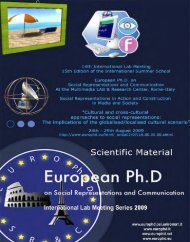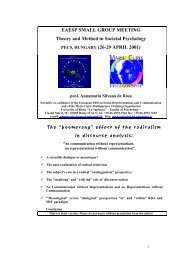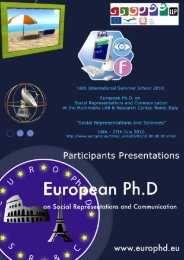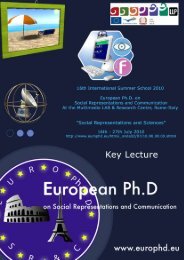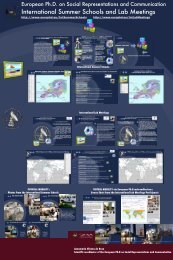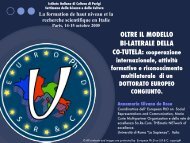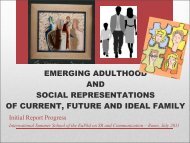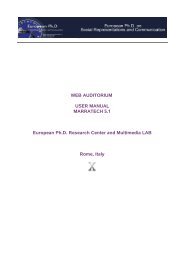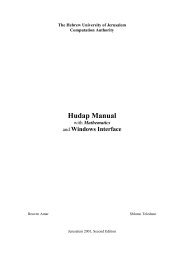Individual
Individual
Individual
You also want an ePaper? Increase the reach of your titles
YUMPU automatically turns print PDFs into web optimized ePapers that Google loves.
Coping with immigrant’s<br />
stigma:<br />
perceived discrimination, social identity,<br />
16-27 July, 2010, Roma<br />
individual and collective coping<br />
strategies, and well-being<br />
Magdalena Bobowik, Nekane Basabe &<br />
Darío Páez<br />
University of the Basque Country
Immigration in Spain<br />
In 2010, the % of the international migrants in Spain is<br />
higher than in Germany, UK, France, and even US<br />
– 14,1 %<br />
In overall, Spain had one<br />
of the highest net<br />
migration rates in<br />
Europe throughout the<br />
last two decades<br />
(Eurostat, 2010; IOM, 2010)
Immigration in Spain<br />
Top 10 migrant groups in Spain in 2008:<br />
Romania<br />
Morocco<br />
Ecuador<br />
Colombia<br />
Sub-Saharan African<br />
countries<br />
Bulgaria<br />
China<br />
Peru<br />
Argentina<br />
Bolivia<br />
(Permanent Observatory of Immigration, 2009)
Immigrant’s Stigma<br />
In the EU and in countries with<br />
rapid growth of minority<br />
populations (immigrants), as the<br />
case of Spain, attitudes<br />
toward immigration have<br />
become more restrictive (from<br />
2001 to 2005)<br />
(Meuleman, Davidov, & Billiet, 2009)
The “perpetrator’s<br />
perspective”<br />
Immigrant’s Stigma<br />
Attitudes towards immigration in<br />
Spain - a rise of reactance to<br />
immigration:<br />
37% - reluctant<br />
33% - tolerant<br />
30% - ambivalent<br />
Immigration was the third most<br />
frequently mentioned problem<br />
after unemployment, and<br />
problems concerning economy<br />
and politics.<br />
(Spanish Center for Sociological Research,<br />
2008).
Immigrant’s Stigma<br />
The “target’s perspective”<br />
Perceived<br />
Discrimination:<br />
awareness of<br />
stigma<br />
Social stigma is a function of having an<br />
attribute that conveys a devalued social<br />
identity of certain social groups in<br />
particular context<br />
(Crocker, Major & Steele, 1998; Major & O’Brien, 2005)<br />
Perceived Group and Personal<br />
Discrimination as an indicator of<br />
stigmatization– although we are aware that<br />
the stigma is a broader concept
Perceived<br />
Discrimination:<br />
awareness of<br />
stigma<br />
Consequences of Stigma<br />
Depressive<br />
symptoms<br />
Mental and<br />
physical health<br />
Satisfaction<br />
with Life<br />
Collective Selfesteem<br />
(Finch, Kolody, & Vega, 2000;<br />
Noh & Kaspar, 2003)<br />
(Williams, Neighbors,<br />
& Jackson, 2003)<br />
(Basabe, Páez, Aierdi, &<br />
Jiménez-Aristizabal, 2009)<br />
(Branscombe, Schmitt &<br />
Harvey, 1999; Mesch,<br />
Turjeman &Fishman, 2008)
Perceived<br />
Discrimination:<br />
awareness of<br />
stigma<br />
Ethnic / Ingroup<br />
Identification<br />
Consequences of Stigma<br />
Rejection Identification Model<br />
Adaptation<br />
Outcomes<br />
(Branscombe, Schmitt & Harvey, 1999)
Perceived<br />
Discrimination:<br />
awareness of<br />
stigma<br />
National /<br />
Outgroup<br />
Identification<br />
Consequences of Stigma<br />
Rejection Des-Identification Model<br />
Ethnic Identification did not work as a<br />
buffer between perceived<br />
discrimination and stress symptoms<br />
Positive<br />
Attitudes<br />
towards<br />
Outgroup<br />
(Jasinskaha-Lahti, Liebkind, Solheim, 2009)
Stigmatized<br />
individuals do<br />
not have to be<br />
passive<br />
victims of<br />
prejudice and<br />
discrimination<br />
Coping with Stigma<br />
They may act to<br />
deal with the<br />
negative identity or<br />
rebuild a positive<br />
social identity - to<br />
preserve their wellbeing<br />
and self<br />
esteem
Devalued Social<br />
Identity<br />
Social Identity Theory<br />
1.<br />
Permeability<br />
2.<br />
Impermeability<br />
Stability<br />
Legitimacy<br />
3.<br />
Impermeability<br />
(Un)stability<br />
Illegitimacy<br />
<strong>Individual</strong><br />
Mobility<br />
Social<br />
Creativity<br />
Social<br />
Competition<br />
Positive Social<br />
Identity<br />
(Tajfel & Turner, 1979; Ellemers, 1993)
Social Stigma & Self-Esteem<br />
Perceived<br />
Discrimination:<br />
awareness of<br />
stigma<br />
Attributions to<br />
Prejudice<br />
Social<br />
Comparisons<br />
Psychological<br />
Disengagement<br />
Self-Esteem<br />
(Crocker & Major, 1989; Crocker, Major, & Steele, 1998)
Situational<br />
Cues:<br />
Perceived<br />
Group Status<br />
Perceived<br />
Discrimination:<br />
awarness of<br />
stigma<br />
Personal<br />
Characteristics:<br />
Ethnic/ National<br />
Identification<br />
Coping with Stigma<br />
Threateaned<br />
Identity<br />
Collective<br />
Coping<br />
Behavioral &<br />
Cognitive<br />
Behavioral &<br />
Cognitive<br />
<strong>Individual</strong><br />
Coping<br />
Adaptation<br />
Outcomes<br />
(adapted from Major & O’Brien, 2005)
Building up: Social Identity Theory<br />
SOCIAL<br />
CREATIVITY<br />
COPING<br />
WITH<br />
STIGMA<br />
INDIVIDUAL<br />
MOBILITY<br />
SOCIAL<br />
COMPETITION<br />
(Tajfel & Turner, 1979)
Building up: SIT & Relative Deprivation<br />
RE-EVAL UATION<br />
OF COMPARISON<br />
DIMENTION<br />
SUBORDINATE<br />
RECATEGO-<br />
RIZATION /<br />
EXPULSION<br />
SUBORDINATE<br />
RECATEGO-<br />
RIZATION /<br />
ME-US<br />
DIFFERENTIATION<br />
STANDARD /<br />
TEMPORAL<br />
COMPARISON<br />
NEW COMPARISON<br />
GROUP<br />
NEW COMPARISON<br />
DIMENTION<br />
SUPER-ORDINATE<br />
RECATEGO-<br />
RIZATION<br />
INDIVIDUA-<br />
LIZATION<br />
COPING<br />
WITH<br />
STIGMA<br />
REALISTIC<br />
COMPETITION<br />
INDIVIDUAL<br />
MOBILITY /<br />
ASSIMILATION<br />
SOCIAL<br />
COMPETITION<br />
SOCIO-CENTRIC<br />
RELATIVE<br />
DEPRIVATION<br />
(Blanz, Mummendey, Mielke, & Klink, 1998; Mummendey, Kessler, Klink, & Mielke,1999)
Building up: Social Stigma<br />
SOCIAL IDENTITY<br />
COMPARISONS<br />
PERSONAL<br />
IDENTITY<br />
COMPARISONS<br />
INDIVIDUA-<br />
LIZATION<br />
COPING<br />
WITH<br />
STIGMA<br />
ATRIBUTIONS TO<br />
PREJUDICE<br />
DISENGAGEMENT<br />
/ DISTANCING<br />
REALISTIC<br />
COMPETITION<br />
INDIVIDUAL<br />
MOBILITY<br />
SOCIAL<br />
COMPETITION<br />
SOCIO-CENTRIC<br />
RELATIVE<br />
DEPRIVATION<br />
(Crocker & Major, 1989)
Building up: classic coping<br />
RE-EVAL UATION<br />
OF COMPARISON<br />
DIMENTION<br />
SUBORDINATE<br />
RECATEGO-<br />
RIZATION /<br />
EXPULSION<br />
SUBORDINATE<br />
RECATEGO-<br />
RIZATION / ME-US<br />
DIFFERENTIATION<br />
STANDARD /<br />
TEMPORAL<br />
COMPARISON<br />
NEW COMPARISON<br />
GROUP<br />
NEW COMPARISON<br />
DIMENTION<br />
SUPER-ORDINATE<br />
RECATEGO-<br />
RIZATION<br />
INDIVIDUA-<br />
LIZATION<br />
COPING<br />
WITH<br />
STIGMA<br />
ATRIBUTIONS TO<br />
PREJUDICE<br />
DISENGAGEMENT<br />
/ DISTANCING<br />
REALISTIC<br />
COMPETITION<br />
INDIVIDUAL<br />
MOBILITY<br />
SOCIAL<br />
COMPETITION<br />
EMOTIONAL<br />
CONTROL<br />
SOCIO-CENTRIC<br />
RELATIVE<br />
DEPRIVATION<br />
AVOIDING<br />
PREJUDICE<br />
(Carver et al., 1989, Folkman & Lazarus, 1980, Skinner et al., 2003;<br />
Outten, Schmitt, Garcia, & Branscombe, 2009)
RE-EVAL UATION<br />
OF COMPARISON<br />
DIMENTION<br />
SUBORDINATE<br />
RECATEGO-<br />
RIZATION /<br />
EXPULSION<br />
SUBORDINATE<br />
RECATEGO-<br />
RIZATION<br />
STANDARD /<br />
TEMPORAL<br />
COMPARISON<br />
NEW<br />
COMPARISON<br />
GROUP<br />
NEW<br />
COMPARISON<br />
DIMENTION<br />
SUPER-ORDINATE<br />
RECATEGO-<br />
RIZATION<br />
INDIVIDUA-<br />
LIZATION<br />
COPING<br />
WITH<br />
STIGMA<br />
ATRIBUTIONS TO<br />
PREJUDICE<br />
DISENGAGEMENT<br />
/ DISTANCING<br />
REALISTIC<br />
COMPETITION<br />
INDIVIDUAL<br />
MOBILITY<br />
SOCIAL<br />
COMPETITION<br />
EMOTIONAL<br />
CONTROL<br />
SOCIO-CENTRIC<br />
RELATIVE<br />
DEPRIVATION<br />
AVOIDING<br />
PREJUDICE
RE-EVAL UATION<br />
OF COMPARISON<br />
DIMENTION<br />
SUBORDINATE<br />
RECATEGO-<br />
RIZATION /<br />
EXPULSION<br />
SUBORDINATE<br />
RECATEGO-<br />
RIZATION<br />
STANDARD /<br />
TEMPORAL<br />
COMPARISON<br />
NEW<br />
COMPARISON<br />
GROUP<br />
NEW<br />
COMPARISON<br />
DIMENTION<br />
SUPER-ORDINATE<br />
RECATEGO-<br />
RIZATION<br />
INDIVIDUA-<br />
LIZATION<br />
ATRIBUTIONS TO<br />
PREJUDICE<br />
COLLECTIVE<br />
STRATEGIES<br />
DISENGAGEMENT<br />
/ DISTANCING<br />
REALISTIC<br />
COMPETITION<br />
INDIVIDUAL<br />
MOBILITY<br />
SOCIAL<br />
COMPETITION<br />
EMOTIONAL<br />
CONTROL<br />
SOCIO-CENTRIC<br />
RELATIVE<br />
DEPRIVATION<br />
AVOIDING<br />
PREJUDICE
RE-EVAL UATION<br />
OF COMPARISON<br />
DIMENTION<br />
SUBORDINATE<br />
RECATEGO-<br />
RIZATION /<br />
EXPULSION<br />
SUBORDINATE<br />
RECATEGO-<br />
RIZATION<br />
STANDARD /<br />
TEMPORAL<br />
COMPARISON<br />
NEW<br />
COMPARISON<br />
GROUP<br />
NEW<br />
COMPARISON<br />
DIMENTION<br />
SUPER-ORDINATE<br />
RECATEGO-<br />
RIZATION<br />
INDIVIDUA-<br />
LIZATION<br />
ATRIBUTIONS TO<br />
PREJUDICE<br />
INDIVIDUAL<br />
STRATEGIES<br />
DISENGAGEMENT<br />
/ DISTANCING<br />
REALISTIC<br />
COMPETITION<br />
INDIVIDUAL<br />
MOBILITY<br />
SOCIAL<br />
COMPETITION<br />
EMOTIONAL<br />
CONTROL<br />
SOCIO-CENTRIC<br />
RELATIVE<br />
DEPRIVATION<br />
AVOIDING<br />
PREJUDICE
RE-EVAL UATION<br />
OF COMPARISON<br />
DIMENTION<br />
SUBORDINATE<br />
RECATEGO-<br />
RIZATION /<br />
EXPULSION<br />
SUBORDINATE<br />
RECATEGO-<br />
RIZATION<br />
STANDARD /<br />
TEMPORAL<br />
COMPARISON<br />
NEW<br />
COMPARISON<br />
GROUP<br />
NEW<br />
COMPARISON<br />
DIMENTION<br />
SUPER-ORDINATE<br />
RECATEGO-<br />
RIZATION<br />
INDIVIDUA-<br />
LIZATION<br />
ATRIBUTIONS TO<br />
PREJUDICE<br />
BEHAVIORAL<br />
STRATEGIES<br />
DISENGAGEMENT<br />
/ DISTANCING<br />
REALISTIC<br />
COMPETITION<br />
INDIVIDUAL<br />
MOBILITY<br />
SOCIAL<br />
COMPETITION<br />
EMOTIONAL<br />
CONTROL<br />
SOCIO-CENTRIC<br />
RELATIVE<br />
DEPRIVATION<br />
AVOIDING<br />
PREJUDICE
RE-EVAL UATION<br />
OF COMPARISON<br />
DIMENTION<br />
SUBORDINATE<br />
RECATEGO-<br />
RIZATION /<br />
EXPULSION<br />
SUBORDINATE<br />
RECATEGO-<br />
RIZATION<br />
STANDARD /<br />
TEMPORAL<br />
COMPARISON<br />
NEW<br />
COMPARISON<br />
GROUP<br />
NEW<br />
COMPARISON<br />
DIMENTION<br />
SUPER-ORDINATE<br />
RECATEGO-<br />
RIZATION<br />
INDIVIDUA-<br />
LIZATION<br />
ATRIBUTIONS TO<br />
PREJUDICE<br />
COGNITIVE<br />
STRATEGIES<br />
DISENGAGEMENT<br />
/ DISTANCING<br />
REALISTIC<br />
COMPETITION<br />
INDIVIDUAL<br />
MOBILITY<br />
SOCIAL<br />
COMPETITION<br />
EMOTIONAL<br />
CONTROL<br />
SOCIO-CENTRIC<br />
RELATIVE<br />
DEPRIVATION<br />
AVOIDING<br />
PREJUDICE
Objectives of the Study<br />
To explore the structure of collective and individual<br />
strategies of coping with the negative social identity<br />
To test the model of coping with the stigma just<br />
presented
Method
Method: Participants &<br />
Participants<br />
Procedure<br />
1250 immigrant<br />
persons proceeding from:<br />
Procedure<br />
Bolivia (250)<br />
Sub-Saharan<br />
Africa (250)<br />
Colombia<br />
(250)<br />
Marocco (250)<br />
Romania (250)<br />
The questionnaires: individually administered by trained interviewers<br />
(in collaboration with the Basque Observatory of Immigration)<br />
Administered in Spanish; however, the interviewers were backed-up<br />
with English and French translation of the questionnaire
Situational Clues:<br />
Perceived Group Status<br />
Personal Characteristics:<br />
Identification<br />
Method: Measures<br />
Collective<br />
Coping<br />
Perceived Discrimination:<br />
awareness of stigma<br />
Adaptation<br />
Outcomes<br />
<strong>Individual</strong><br />
Coping
Group Status<br />
Permeability (1 items): 1–5<br />
The Immigrants from my country who live here have an opportunity<br />
to take their place in the Basque society on an equal footing with<br />
everyone else<br />
(Un)stability (2 items): 1–5<br />
The situation of the immigrants here might get better<br />
Legitimacy (1 item): 1–5<br />
It's fair that people from here (Basques) should do better in life than<br />
the immigrants<br />
Ethnic vs National Identity (1 item each): 1–5<br />
To what extent do you feel Colombian / Rumanian / Moroccan? vs<br />
Spanish?
Perceived Discrimination<br />
Perceived Personal Discrimination (5 items): 1–5<br />
During your stay in the Basque Country, how frequently:<br />
have people from here, either the Basque or the Spanish, made<br />
you feel that you are a financial threat to the Basque (taking their<br />
jobs, abusing welfare benefits, etc.)?<br />
have you felt discriminated, stared at, heard negative comments,<br />
or felt rejected because of your physical appearance?<br />
have people from here, either the Basque or the Spanish, made<br />
you feel ignored or neglected?
Adaptation Variables: Personal Adaptation<br />
Satisfaction with Life (1 item): 1–10<br />
All things considered, how satisfied are you with your life as a whole<br />
these days?<br />
Bradburn’s Affect Balance Scale (18 items): 1–4<br />
Have you ever felt very worried? / cheerful?<br />
Psychological Well-Being (15 items): 1–6<br />
Environmental Mastery:<br />
I am good at managing the responsibilities of my daily life<br />
Positive Relations with Others:<br />
I have warm and trusting relationships with others<br />
Personal Growth:<br />
I've had experiences that challenged me to grow and become a better<br />
person
Adaptation Variables: Collective Adaptation<br />
Collective Self-Esteem Scale (5 items): 1–7<br />
Private Collective Self-Esteem:<br />
I feel good about the national group I belong to<br />
Importance to Identity:<br />
My nationality is important to me<br />
Keyes’ Social Well-Being (16 items): 1–5<br />
Social Contribution:<br />
I have something important to contribute to the society<br />
Social Integration:<br />
I feel I belong to something I’d call a community<br />
Social Actualization:<br />
Our society is becoming a better place for people like me<br />
Social Acceptance:<br />
People are basically good<br />
Social Coherence:<br />
I cannot make sense of what’s going on in the world
<strong>Individual</strong> Coping Strategies<br />
Disengagement/ Distancing (1-5)<br />
<strong>Individual</strong> Mobility<br />
Avoiding Prejudice<br />
Emotional Control<br />
Psychological Disengagement / Desidentification<br />
<strong>Individual</strong>ization<br />
<strong>Individual</strong> Subordinate Recategorization (Me-us<br />
Differentiation)<br />
Superordinate Recategorization<br />
Intragroup and Temporal Comparison<br />
Items are presented in the results section
Collective Coping Strategies<br />
Cognitive Creativity (1-5)<br />
New Comparison Group<br />
Re-evaluation of Comparison Dimension<br />
New Comparison Dimension<br />
Intragroup Subordinate Recategorization (Differentiation)<br />
Attribution to Prejudice<br />
Social and Realistic Competition<br />
Sociocentric Relative Deprivation<br />
Belief in a Just World in Future<br />
Realistic Competition<br />
Items are presented in the results section
Results
Natives<br />
Immigrants<br />
Well-being: Immigrants vs.<br />
8<br />
7<br />
6<br />
5<br />
4<br />
3<br />
2<br />
1<br />
0<br />
Positive Affect<br />
Negative Affect<br />
Soc-Eco SWL<br />
Personal SWL<br />
Natives<br />
Positive Relations<br />
Environmental Mastery<br />
Personal Growth<br />
Social Integration<br />
Social Contribution<br />
Social Coherence<br />
Social Actualization<br />
Social Acceptance<br />
Collective Self-esteem
Group status related variables:<br />
Natives<br />
Immigrants<br />
Immigrants vs. Natives<br />
4<br />
3,5<br />
3<br />
2,5<br />
2<br />
1,5<br />
1<br />
0,5<br />
0<br />
Subtle Prejudice<br />
Negative Emotions<br />
Permeability<br />
Stability<br />
Legitimacy<br />
Immigration perceived as a threat<br />
Perceived Discrimination
Collective Coping Strategies<br />
.78 .71<br />
8<br />
.63<br />
.71<br />
15<br />
CREATIVITY: NEW<br />
DIMENSIONS OF<br />
COMPARISON<br />
.91 .87 .78 .87 .80 .71 .82 .91 .88 .73 .67<br />
.65<br />
4 13 14 6 11 5 10 12 16 1 3<br />
.41 .49 .62 -.22 .69 .34 -.43 .71 .56 .41 .46 .68 .74<br />
ATTRIBUTION TO<br />
PREJUDICE<br />
.31<br />
.13<br />
COMPETITION,<br />
EXPULSION<br />
Model fit:<br />
χ² (57, N = 1250) = 222.098, p < .001; CFI = 0.931; SRMR = 0.037<br />
-.53<br />
.14<br />
.24<br />
CREATIVITY:<br />
NEW GROUP OF<br />
COMPARISON
Collective Coping Strategies<br />
.78<br />
8<br />
.63<br />
.71<br />
15<br />
.71<br />
CREATIVITY: NEW<br />
DIMENSIONS OF<br />
COMPARISON<br />
8. Despite what people say, we immigrants are<br />
much more hard-working than the Basques<br />
15. We people from my country are better in<br />
many ways than people from here
Collective Coping Strategies<br />
.91 .87 .78 .80<br />
4 13 14<br />
11<br />
.41 .49 .62<br />
ATTRIBUTION TO<br />
PREJUDICE<br />
.69<br />
4. We don't take jobs away from<br />
the local people: we do the jobs<br />
they don't want to do<br />
11. The bad situation of immigrants<br />
from my country is caused by a<br />
lack of support from the Basques<br />
and the Spaniards<br />
13. Immigrants earn less money<br />
and have fewer opportunities to<br />
better themselves than they<br />
deserve<br />
14. The poor view that some<br />
Basques hold of immigrants is<br />
because these people have a lot of<br />
prejudices
Collective Coping Strategies<br />
5. The bad things that people say<br />
about us are caused by the<br />
behaviour of a small minority; most<br />
of us aren't like that<br />
6. We immigrants ought to have<br />
the same services and rights as<br />
people from here<br />
10. At times the unacceptable<br />
behaviour of some immigrants<br />
makes the Basques think badly of<br />
us<br />
11. The bad situation of immigrants<br />
from my country is caused by a<br />
lack of support from the Basques<br />
and the Spaniards<br />
.87 .80 .71 .82 .91 .88<br />
6 11 5 10 12 16<br />
.34 -.43 .71<br />
.56 .41 .46<br />
COMPETITION,<br />
EXPULSION<br />
12. We immigrants from my country can band<br />
together to fight for our rights and be like people<br />
from here<br />
16. I have faith that in time, justice will be done<br />
and prejudice towards us will become a thing of<br />
the past
Collective Coping Strategies<br />
1. There are other groups that are seen in a worse<br />
light here than people from my country<br />
3. The Basques and the Spaniards treat people from<br />
my country more kindly than they treat other<br />
immigrants<br />
.73 .67<br />
1<br />
3<br />
.68 .74<br />
CREATIVITY:<br />
NEW GROUP OF<br />
COMPARISON
<strong>Individual</strong> Coping Strategies<br />
.18 .93<br />
17<br />
.98<br />
18<br />
.36<br />
INDIVIDUALIZATION<br />
.74 .58 .65 .78 .83 .91 .74 .74 .71 .99 .76<br />
8 10 12 9 13 6 14 15 19 4 5<br />
.18<br />
.67 .81 .76 .59 .22 .22 .51 .42 .68 .55 .57 .85 .64<br />
INTRAGROUP<br />
TEMPORAL<br />
COMPARISON<br />
.11<br />
INDIVIDUAL<br />
MOBILITY<br />
Model fit:<br />
χ² (60, N = 1250) = 275.797, p < .001; CFI = 0.994; SRMR = 0.043<br />
.22<br />
.35<br />
ME-US<br />
DIFFERENCIATION
<strong>Individual</strong> Coping Strategies<br />
.18 .93<br />
17<br />
.98<br />
18<br />
.36<br />
INDIVIDUALIZATION<br />
17. I feel more like a citizen of the planet than a<br />
member of a national group<br />
18. I don't identify with any group (either the Basques<br />
or the people from my country)
<strong>Individual</strong> Coping Strategies<br />
.74 .58 .65 .78<br />
8 10 12 9<br />
.67 .81 .76 .59<br />
INTRAGROUP<br />
TEMPORAL<br />
COMPARISON<br />
8. My own personal situation is fairly<br />
better than the situation of most<br />
immigrants from my country<br />
9. Now I'm enjoying the experiences<br />
of daily life more than before and I'm<br />
trying to make the most of them<br />
10. When I think of what my plans<br />
and prospects used to be, my<br />
situation is better than I expected<br />
then<br />
12. Compared with the past, my<br />
situation is better than before
<strong>Individual</strong> Coping Strategies<br />
6. I make an effort to overcome the<br />
difficulties I face as an immigrant<br />
13. I throw myself in and concentrate on<br />
my studies or work so as not to have to<br />
think about my situation, and I act as if<br />
everything were O.K.<br />
14. I try to stay clear of people who think<br />
badly of immigrants<br />
15. I try not to let it get to me on an<br />
emotional level when immigrants are<br />
badly treated<br />
19. I make an effort to demonstrate that<br />
I'm better than people from here in my<br />
working life (or whatever<br />
else it is that you do)<br />
.83 .91 .74 .74 .71<br />
13 6 14 15 19<br />
.51 .42<br />
.68 .55 .57<br />
INDIVIDUAL<br />
MOBILITY
<strong>Individual</strong> Coping Strategies<br />
4. I feel very different from most of the people from my<br />
country<br />
5. We immigrants from my country are very different<br />
amongst ourselves<br />
.99 .76<br />
4<br />
5<br />
.85 .64<br />
ME US-<br />
DIFFERENCIATION
.55<br />
.34<br />
-.50<br />
-.38<br />
-.14<br />
.08<br />
PERMEABILTY<br />
PERSONAL<br />
DISCRIMI-<br />
NATION<br />
LEGITIMACY<br />
(UN)STABILITY<br />
<strong>Individual</strong> Mobility<br />
.11<br />
.27 (.02)<br />
.53<br />
-.13<br />
-.10<br />
-.23(-.03)<br />
-.33 (.12)<br />
.06<br />
(.01)<br />
-.08<br />
NATIONAL<br />
IDENTITY<br />
.11(-.02)<br />
INDIVIDUAL<br />
MOBILITY<br />
.23<br />
GENERAL<br />
SWL<br />
.81<br />
.57<br />
SOCIO-<br />
ECONOMIC<br />
SWL<br />
PSYCHO-<br />
SOCIAL<br />
SWL<br />
Model fit: χ² (193, N = 1250) = 874.313, p < .001; CFI = 0.929; SRMR = 0.052
.55<br />
.34<br />
-.50<br />
-.38<br />
-.14<br />
.08<br />
PERMEABILITY<br />
PERSONAL<br />
DISCRIMI-<br />
NATION<br />
LEGITIMACY<br />
(UN)STABILITY<br />
<strong>Individual</strong> Mobility<br />
.53<br />
-.13<br />
.11<br />
-.23 (-.01)<br />
-.27<br />
-.21 (.11)<br />
.27<br />
(-.03)<br />
-.08<br />
NATIONAL<br />
IDENTITY<br />
.08<br />
(-.02)<br />
INDIVIDUAL<br />
MOBILITY<br />
.21<br />
PWB<br />
.79<br />
.60<br />
.86<br />
PERSONAL<br />
GROWTH<br />
POSITIVE<br />
RELATIONS<br />
ENVIRON-<br />
MENTAL<br />
MASTERY<br />
Model fit: χ² (417, N = 1250) = 1787.787, p < .001; CFI = 0.904; SRMR = 0.058
.55<br />
Intragroup Temporal Comparison<br />
.08<br />
-.38<br />
-.50<br />
-.14<br />
.34<br />
(UN)STABILITY<br />
PERSONAL<br />
DISCRIMI-<br />
NATION<br />
LEGITIMACY<br />
PERMEABILITY<br />
-.13<br />
-.09<br />
.23<br />
(-.01)<br />
-.12 (.17) -.23<br />
-.19<br />
.32<br />
(-.18)<br />
.11<br />
NATIONAL<br />
IDENTITY<br />
INTRAGROUP<br />
TEMPORAL<br />
.74<br />
GENERAL<br />
SWL<br />
.80<br />
.59<br />
SOCIO-<br />
ECONOMIC<br />
SWL<br />
PSYCHO-<br />
SOCIAL<br />
SWL<br />
Model fit: χ² (195, N = 1250) = 769.7498, p < .001; CFI = 0.942; SRMR = 0.045
.34<br />
Intragroup Temporal Comparison<br />
.55<br />
-.14<br />
-.38<br />
-.50<br />
.08<br />
PERMEABILITY<br />
PERSONAL<br />
DISCRIMI-<br />
NATION<br />
(UN)STABILITY<br />
LEGITIMACY<br />
.24<br />
-.13<br />
.03<br />
-.23 (-.01)<br />
.11<br />
-.14<br />
(.18)<br />
-.08<br />
(-.17)<br />
.11<br />
NATIONAL<br />
IDENTITY<br />
INTRAGROUP<br />
TEMPORAL<br />
.67<br />
PWB<br />
.72<br />
.59<br />
.89<br />
PERSONAL<br />
GROWTH<br />
POSITIVE<br />
RELATIONS<br />
ENVIRON-<br />
MENTAL<br />
MASTERY<br />
Model fit: χ² (389, N = 1250) = 1537.285, p < .001; CFI = 0.924; SRMR = 0.046
.34<br />
.56<br />
-.14<br />
-.38<br />
-.50<br />
.08<br />
Attribution to Prejudice<br />
PERMEABILITY<br />
PERSONAL<br />
DISCRIMI-<br />
NATION<br />
(UN)STABILITY<br />
LEGIMACY<br />
-.13<br />
.21<br />
-.06<br />
-.49<br />
.08<br />
-.08 (.03)<br />
NATIONAL<br />
IDENTITY<br />
-.08<br />
ATTRIBUTION<br />
TO PREJUDCE<br />
.13<br />
(.12)<br />
COLLECTIVE<br />
SELF-<br />
ESTEEM<br />
ETHNIC<br />
IDENTITY<br />
.80<br />
.82<br />
PRIVATE<br />
SELF-<br />
ESTEEM<br />
IDENTITY<br />
IMPORTANCE<br />
Model fit: χ² (175, N = 1250) = 822.222, p < .001; CFI = 0.928; SRMR = 0.048<br />
.28<br />
.41
.57<br />
.08<br />
-.50 .34<br />
-.14<br />
-.38<br />
Attribution to Prejudice<br />
(UN)STABILITY<br />
LEGIMACY<br />
PERMEABILITY<br />
PERSONAL<br />
DISCRIMI-<br />
NATION<br />
.10<br />
.09<br />
.02<br />
-.54<br />
-.14<br />
.32<br />
-.31<br />
NATIONAL<br />
IDENTITY<br />
ATTRIBUTION<br />
TO PREJUDCE<br />
.01<br />
SOCIAL<br />
WELL-BEING<br />
ETHNIC<br />
IDENTITY<br />
.86<br />
.86<br />
SOCIAL<br />
ACTUALIZATIO<br />
N<br />
SOCIAL<br />
ACEPTANCE<br />
Model fit: χ² (176, N = 1250) = 808.399, p < .001; CFI = 0.929; SRMR = 0.050<br />
.28
Conclusions
Taxonomy<br />
Four-factor structure of both the individual and the<br />
collective coping with negative social identity<br />
<strong>Individual</strong> strategies include:<br />
Intragroup and Temporal Comparison<br />
<strong>Individual</strong> Mobility<br />
<strong>Individual</strong>ization & Superordinate Categorization<br />
Me-Us Differentiation or Subordinate<br />
Categorization<br />
Collective strategies include:<br />
Attributions to Prejudice and Discrimination<br />
Social Creativity: New Comparison Group<br />
Social Creativity: New Comparison Dimension<br />
Differentiation and Competition
<strong>Individual</strong> Mobility<br />
Low perceived discrimination leads to attempts for<br />
individual mobility and to higher satisfaction with life and<br />
psychological well-being.<br />
When immigrants perceive the group boundaries as<br />
permeable and the status differences as legitimate, they<br />
opt for individual upward mobility, which in turn leads to<br />
higher personal well-being: satisfaction with life (SWL)<br />
and psychological well-being (PWB)<br />
Whereas permeability – though modestly – affects<br />
immigrants’ satisfaction with life only directly, legitimacy<br />
has an indirect effect on this component of well-being, being<br />
mediated by striving for individual mobility.<br />
Perceived discrimination inhibits national identification<br />
<strong>Individual</strong> mobility is related to national desidentification<br />
(ethnic identity does not play a significant role)
Intragroup and Temporal<br />
Comparison<br />
Perception of (un)stability and low discrimination<br />
activate intragroup and temporal comparison strategy –<br />
this strategy predicts immigrants personal well-being (SWL<br />
and PWB)<br />
Perceived illegitimacy and permeability lead to higher<br />
SWL, and illegitimacy to higher PWB<br />
Perceived discrimination has a negative indirect effect on<br />
SWL and PWB through intragroup temporal comparison<br />
National identification augments the tendency to make<br />
intragroup and temporal comparisons as a form to cope<br />
with the stigma
Attributions to Prejudice<br />
Perception of impermeability of group boundaries and<br />
personal discrimination predict making attributions to<br />
prejudice<br />
Attributions to prejudice have an indirect effect on<br />
collective self-esteem (CSE) - ethnic identification serves<br />
a a self-esteem protector; however, this strategy does not<br />
reinforce social well-being (SWB)<br />
National desidentification’s role is less significant for both<br />
CSE and SWB<br />
Perception of (un)stability and illegitimacy of group status<br />
differences contributes to higher CSE, while permeability is<br />
crucial for SWB<br />
Perceived discrimination has stronger consequences for<br />
SWB than for CSE - protective role of attributions to<br />
prejudice and ethnic identity only for CSE
General Conclusions<br />
Perceived group status has a great relevance for<br />
negative identity management and its impact for<br />
adaptation – mostly in line with SIT:<br />
Permeability and legitimacy: individual mobility – “getting out” on<br />
one’s own<br />
(Un)stability: intragroup temporal comparison – an instance of<br />
optimism or cognitive restructuration?<br />
Impermeability and partly illegitimacy: attributions to prejudice –<br />
the barriers to leaving the group and perceiving ingroup low status<br />
as unfair stimulates collective strategies<br />
<strong>Individual</strong> and collective strategies have an impact on<br />
personal (SWL and PWB) and collective (CSE) wellbeing,<br />
respectively<br />
National identification played a more significant role in<br />
individual strategy- personal well-being models, whereas<br />
ethnic identification served as a buffer for collective selfesteem
Thank you!<br />
magdalena.bobowik@ehu.es




